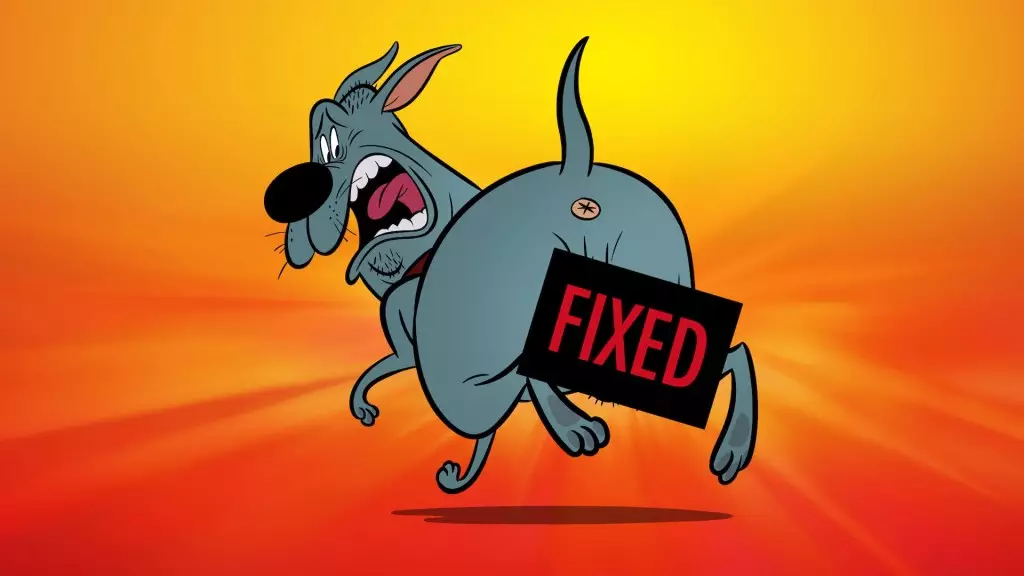In the realm of adult animation, where crude humor and shocking narratives often prevail, *Fixed* brings a level of audacity that demands your attention. Premiering at the Annecy International Festival of Animation, this film straddles the line between absurd and endearing. It follows Bull, a dog grappling with the emotional upheaval of impending castration. Yes, you read that right. With its unapologetic humor and bold storytelling, *Fixed* channels the outrageous spirit found in classics like Seth Rogen’s *Sausage Party*, yet does it with a whimsical charm that challenges the conventional norms of animated films.
Unlike many contemporary animations that offer sanitized storytelling for the palate of children, *Fixed* fully embraces its R-rating from the get-go, signaling that this is not just a family film masquerading as one. Yet, amidst the crude jokes and explicit situations, there lies a heart that is surprisingly relatable, echoing sentiments of love, insecurity, and the frantic desperation that arises when facing change—universal experiences whether you’re fleshy or four-legged.
Crude Humor as a Gateway to Deeper Themes
On the surface, the film positions itself as a raucous romp through the canine underworld, complete with vivid depictions of a dog’s obsession with his own anatomy. However, the charm of *Fixed* doesn’t just lie in its audacity but also in its ability to juxtapose crude humor with deeper themes of identity and acceptance. Bull’s antics, from his awkward advances towards desirable showdog Honey to his gatherings with his equally bonkers buddies, reveal the vulnerabilities that accompany companionship, self-image, and societal expectations—even in the animal kingdom.
Here, the dogs are rendered with an almost cartoonishly grotesque flair reminiscent of bygone animated eras, yet they possess an individuality that makes them instantly relatable. As Bull navigates his world, the influence of traditional animated narratives becomes evident. The dog park, akin to a bustling city for metaphoric sojourners, serves as a backdrop for the interaction of themes such as competition, desire, and the age-old trope of achieving acceptance by one’s peers. In this light, the character of Bull becomes an unlikely hero on a quest not just for physical autonomy, but also for emotional validation in a society that increasingly demands conformity.
Sights and Sounds: The Artistic Vision
Director Genndy Tartakovsky and co-writer Jon Vitti take creative liberties that could easily ruffle feathers. While many may dismiss the film’s crass humor as a mere gimmick, the portrayal of Bull’s plight—it is, after all, a stark metaphor for any moment when one feels deprived of agency—strikes a universal chord. The animation itself takes cues from the nostalgic design of Saturday morning cartoons, but rather than recycling familiar storylines, it reinforces an unspoken notion: even in a world filled with shtick, the simplest emotional truths resonate deeply.
Yet, one has to question why such a wild ride was handed to Netflix rather than being thrust onto the big screen. By doing this, the creators are both liberating the discourse around adult animation and simultaneously eroding the boundaries that have historically caged it. When parents unwittingly expose their children to such content—entangled as it is with the chaos of doggie hijinks—they are inadvertently contributing to a more expansive understanding of animated storytelling. It’s a double-edged sword; creators must carry the responsibility of delivering offensive humor while acknowledging that the audience can be just as volatile in their reactions.
Character Dynamics that Challenge Stereotypes
As Bull wrestles with the looming loss of his testicles—which he humorously dubs “Old Spice and Napoleon”—emotional stakes are raised. An unlikely tension ensues when he competes for the affections of the stunning Afghan hound Honey alongside rivalry from the narcissistic showdog Sterling. This not-so-innocent love triangle propels the narrative forward, offering a canvas on which the complexities of loyalty and jealousy are illustrated with canine flair.
Undeniably, crass humor envelopes the film, and one may argue that it promotes a culture of insensitivity. However, therein lies its charm—*Fixed* allows for uncomfortable conversations to occur under the veil of irreverence. It cheekily points out that beneath furrowed brows and heavy panting lies a need for acceptance that knows no bounds—whether it concerns physical traits or emotional qualities.
Emphasizing a personal connection with these characters, the film ultimately doesn’t shy away from any judgments but rather invites the audience to embrace a spectrum of emotions both wild and tame. The outrageous decisions taken by Bull and his friends exuberantly raise the mirror not only to the absurdities of pet ownership but also to the very human experience—an experience rife with the trials of love, loss, and identity amidst chaos.


Leave a Reply